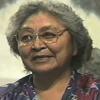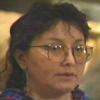 ,
, 
Helen Wells of Kotzebue, Alaska speaks on February 29, 1996 during the Communities of Memory public storytelling event held at the NANA Museum in Kotzebue, Alaska from February 29 to March 2, 1996. She talks about members of the Alaska Territorial Guard training in the villages of Noorvik and Selawik during World War II and what it was like to have blackouts. Helen speaks in Iñupiaq, with Rachel Craig and Ruthie Sampson translating the stories into English.
Digital Asset Information
Project: Kotzebue Communities of Memory
Date of Interview: Feb 29, 1996
Narrator(s): Helen Wells
Transcriber: Leslie McCartney
After clicking play, click on a section to navigate the audio or video clip.
Sections
Helen Wells speaking in Iñupiaq about experiences with the Alaska Territorial Guard and members training in the village
Ruth Sampson translating what Helen Wells said about members of Alaska Territorial Guard training, following commands, and almost walking into the water
Ruth Sampson translating what Helen Wells said about seeing an odd glow one winter in Selawik and being afraid to walk home from church in the dark
Ruth Sampson translating story that Helen Wells told that she had heard from her husband when he was in the Alaska Territorial Guard in Noorvik and meeting Commander Muktuk Marston
Helen Wells speaking in Iñupiaq about blackouts during World War II, and individual family members who were in the Alaska Territorial Guard, in particular her brother and grandfather
Ruth Sampson translating what Helen Wells said about how they put dark shades over the windows to block the light out, and how life was different back then with people using dogteams
Ruth Sampson translating what Helen Wells said about her brother and her grandfather being in the Alaska Territorial Guard, and how the ATG protected everyone and made them feel safe
Click play, then use Sections or Transcript to navigate the interview.
After clicking play, click a section of the transcript to navigate the audio or video clip.
Transcript
HELEN WELLS: But I wanna talk Eskimo. Sorry, if you can’t understand.
CYNTHEA AINSWORTH: That’s okay.
RACHEL CRAIG: (Speaks in Iñupiaq).
HELEN WELLS: Okay -- um -- When we were kids, we know -- um -- (speaks in Iñupiaq: translation follows).
RACHEL CRAIG: (translating while Helen is speaking) She’s talking about one of the ATG men couldn’t stop and he start walking through the water ‘cuz he didn’t hear a command for him to do otherwise.
And the kids used to follow these soldiers to see what would happen. And that’s one of things that happened.
HELEN WELLS: (Speaks in Iñupiaq).
RACHEL CRAIG: (translating what Helen just said) And if nobody said anything to him he would continue into the water.
HELEN WELLS: (Speaks in Iñupiaq).
RACHEL CRAIG: (translating for Helen) They bother with ATG activity. At the time, there was also something brought --
HELEN WELLS: (Speaks in Iñupiaq).
RACHEL CRAIG: (Inaudible)
RUTH SAMPSON: (Speaks in Iñupiaq).
(translating what Helen has been saying) Please correct me. She said -- ah -- she was a child when they formed the ATG, and her grandpa, her dad and one brother and many uncles were there.
She was living in Selawik at the time, and she said they were very serious about -- um -- that -- um -- being the in the ATG, real stern -- ah -- When you look at them, you couldn’t do things in front of them and she remember -- um -- uh --
One of her uncles had learned some things about being in the military and -- um -- As children, they followed them all over town like if they’re marching or doing whatever they did at the time.
And one summer -- um -- one of her uncles was in charge of -- um -- the guys that were in the ATG and I guess he started them on a march and -- um -- maybe he learned several commands in English but not all the commands. And they started -- uh -- heading towards the water at his command.
Uh -- they kept going and -- um -- he couldn’t remember the correct terms to tell them which way to turn to turn away from the water and there they were, just keep on going to the water.
Finally, someone -- um -- someone told him the correct command and they managed to turn before they walk right into the water. That’s how serious they were, it didn’t look like they were going to stop unless they were told. So, they took their job very seriously.
And -- um -- then one Christmas -- ah -- when they were at Selawik, people talked about seeing a glow or light and -- um -- she remember they came into the church and said they saw something. You know, it was wintertime. And Bert Harvey was the Pastor at the time and he kept on going with the church service and Helen remembers being afraid.
Her parents were gone -- uh -- and she -- uh -- figured maybe she would go home with other people, because she was afraid of walking home alone. And when the church service was over -- um -- she went home with the others.
So people heard and saw things that time -- um -- who knows what they might have been.
And the ATG -- ah -- were very serious. They had them go through what’s called a black-out. Um -- I’m not that familiar with the term. I’ve heard some things -- She didn’t quite explain. Maybe she could explain what they did during a black-out.
But -- ah -- ATG were real serious. They acted like enemies were coming and they had everything in order.
And -- ah -- her husband was from Noorvik, and he was in Noorvik when the ATGs were there and he related an incident that she shared. And um -- ah --
He said that one time -- um -- while the ATGs were doing whatever they do in Noorvik -- um -- there was a white man and that was coming. And -- um -- all this time everybody really respected the ATG there. They -- they took themselves seriously, people took them seriously. And then this white man came around and one of the men say, you know, maybe he say something like, “Now who’s this guy?”
And he didn’t seem to show much respect for him. "Who’s this guy that just come around?" And it turned out that was -- somebody told him that’s your commander.
And it turned out that was Muktuk Marston. And so when the man found out he -- ah -- without, you know, show his respect, throw his hat down, and even knelt down because, you know, he realized who he was talking to.
(Speaks in Iñuqiaq).
Um -- they were very serious about it and they were ready to meet the enemy. And she’s saying if the enemies had come they would have been finished off by the ATG army, 'cause they were real serious.
And -- um -- she wasn't really going to tell a story be she decided to share --
RACHEL CRAIG: We’ve -- we’ve asked -- um -- Helen to tell us a little bit more about her experiences -- um -- about the members of her family that were in ATG, what life was like at that time, and to explain to us a little bit more about the blackouts and -- and -- some of the other things that she remembers from that time.
HELEN WELLS: (Speaks in Iñupiaq).
WALTER SAMPSON: Ruth, would you please interpret that for -- for the -- rest please.
RUTH SAMPSON: Uh -- I asked her earlier to explain what a blackout was 'cause I wasn’t sure what is was myself and um -- (Iñupiaq).
HELEN WELLS: (Iñupiaq). UNIDENTIFIED MAN IN AUDIENCE: Or real dark curtains.
RUTH: Okay, so they -- they had them put real dark shades on the windows so not -- not even a little light could be seen, and they had them turn off their -- um -- their gas lanterns so that way the whole village was -- ah -- completely dark.
And -- uh -- she went on to say life was different then, there were no snowmachines, only dogteams, and anyone who became of age would start driving dogs soon as they’re old enough. Even the women and girls, they used the dog teams to fetch wood.
And today -- ah -- young people -- um -- are so different. All they want to do is watch TV and have a easy life. They want to eat good food, and someday if there’s no food available she said they’ll certainly suffer.
And someday, we’ll reach a time of suffering, because it won’t continue to be so easy all the time.
She said if she remembered more -- ah -- she would have prepared -- ah -- more to say.
And now Rachel ask her who were those ATG members that she remembers, and she said her brother was one of them. And -- um -- he must have been one of the young ones recruited by the older men. And her grandpa, Aŋatkuq Ballot, was one of the them, too, and probably the most respected because he was probably one of the older ones.
And at that time, they had no one to formerly protect them, so they were real dependent on the ATG and they felt safe. -- Um --
And it was a strange thing when they saw that -- ah -- light or glow. They never did find out what it was.
And -- ah -- Rachel asked her -- um -- it was strange things that they heard and saw, but every time someone reported seeing -- ah -- one of those, they would -- um -- go. They weren’t afraid.
They’d go with their snowshoes to investigate without fear. And they wouldn’t find any trail or anything. It turned out to be good training for them. That's all.
WALTER: Thanks, Ruth. Thank you -- uh -- Helen. Taikuu.

